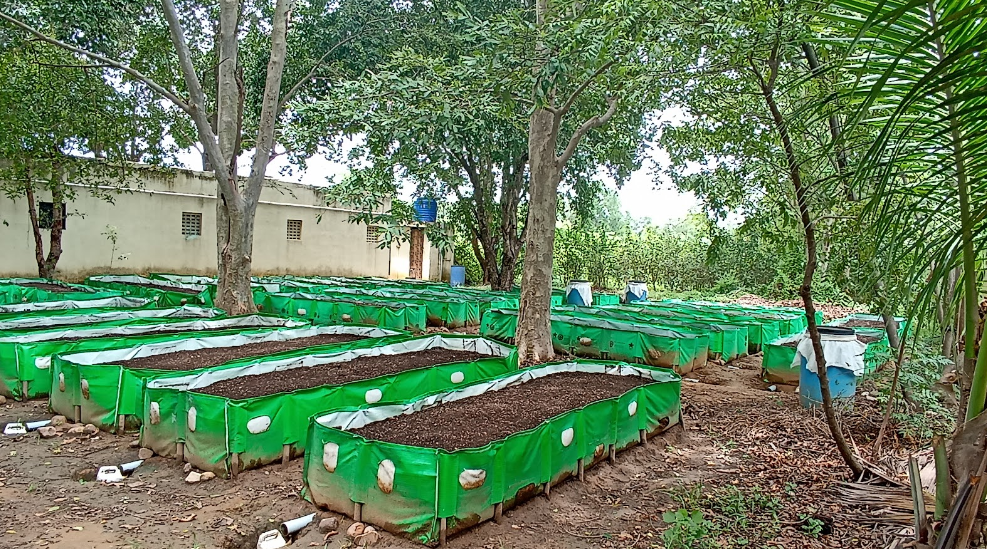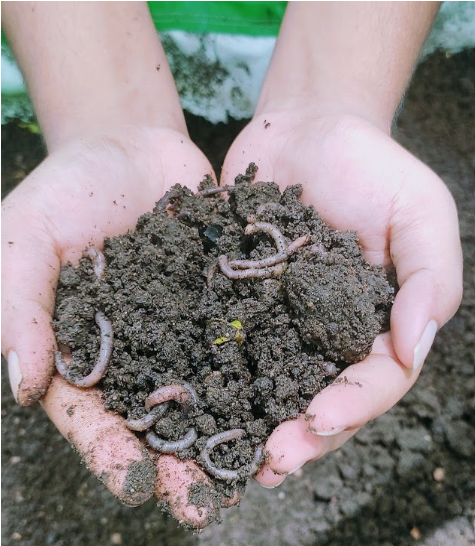Vermicompost – A Black Gold of Farmer
Unleashing the Power of Earthworms to Transform Organic Waste into Fertile Gold.
Vermicomposting is a scientifically proven method of composting that utilizes earthworms to transform organic waste into nutrient-rich vermicompost. It is a natural and sustainable way to recycle organic materials and create a powerful soil amendment. Earthworms, commonly found in soil, play a vital role in this process by consuming organic waste and excreting them as vermicasts. It is also known as “worm-farming” and involves cultivating earthworms specifically for vermicomposting purposes.
Why Vermicompost?
Vermicompost offers a chemical-free solution to enrich soil. However, farmers operating at a small scale face certain challenges. A few of the challenges faced are, Limited availability of quality Farm Yard Manure, constraints in terms of space and high infrastructure costs which in turn hinder vermicompost unit setup. Addressing these obstacles through training, financial support, and collaborations can enable farmers to embrace vermicomposting and unlock its benefits for sustainable agriculture.
Our Vision
Our vision is to empower disciplined and potential grassroots leaders, specifically ex-servicemen, who retire in large numbers each year and are present in all districts across India. By providing them with adequate training, they can establish their own low-cost vermicompost units, thereby creating livelihood opportunities for their families and communities.
Benefits of Vermicompost
Vermicompost is rich in NPK, micronutrients, and beneficial soil microbes, including nitrogen-fixing bacteria, mycorrhizal fungi, phosphate-solubilizing bacteria, and actinomycetes.
Enzymes such as amylase, lipase, cellulase, and chitinase present in vermicompost break down organic matter, releasing nutrients for plant roots.
Vermicompost acts as a growth promoter and protector for crop plants, nurturing soil with plant growth hormones like auxins and gibberellic acid.
It functions as a soil conditioner, leading to the overall improvement of soil quality and farmland, even in degraded and sodic soils.
Soils treated with vermicompost have significantly higher electrical conductivity (EC) and near neutral pH.
Vermicompost exhibits high porosity, aeration, drainage, and water holding capacity, facilitating strong nutrient absorbability and retention.
It influences various yield parameters, including seed germination, enhanced seedling growth rate, flowering, and fruiting of major crops and vegetables.
Well-processed vermicompost helps to suppress weed growth by killing weed seeds present in the soil thus reducing the need for additional weed control measures.
Vermicompost is free-flowing, easy to apply, handle and store, and it does not produce unpleasant odours.
The presence of earthworm cocoons in vermicompost increases the population and activity of earthworms in the soil, further benefiting soil health and nutrient cycling.
The Process of Making Vermicompost: A Sustainable Approach to Waste Management
Introduction:
Vermicomposting, a process that utilises earthworms to convert organic waste into nutrient-rich compost, offers a sustainable solution for waste management while promoting soil health. By following a systematic approach, vermicomposting can be effectively carried out with separate sections for food waste and leafy waste. Lets explore the step-by-step process and timelines involved in making vermicompost.-
Collection: Gather food waste such as fruit and vegetable scraps, coffee grounds, tea bags, and crushed eggshells.
Shredding: Optionally, shred or chop the food waste into smaller pieces to facilitate decomposition.
Bedding: Create a bedding layer in the vermicomposting bin using materials like shredded newspaper, cardboard, dried leaves, or straw. Ensure the bedding is damp but not saturated
Add Worms: Introduce composting worms, like red wigglers or earthworms, into the bedding.
Add Food Waste: Place the food waste into the vermicomposting bin, burying it within the bedding.
Moisture and Aeration: Maintain proper moisture levels by periodically spraying water if the bedding feels dry. Ensure adequate aeration by gently turning the bedding to prevent
compaction. 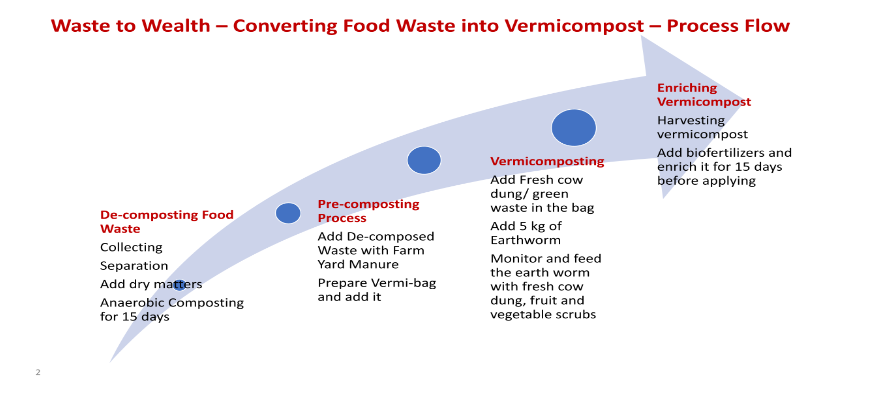
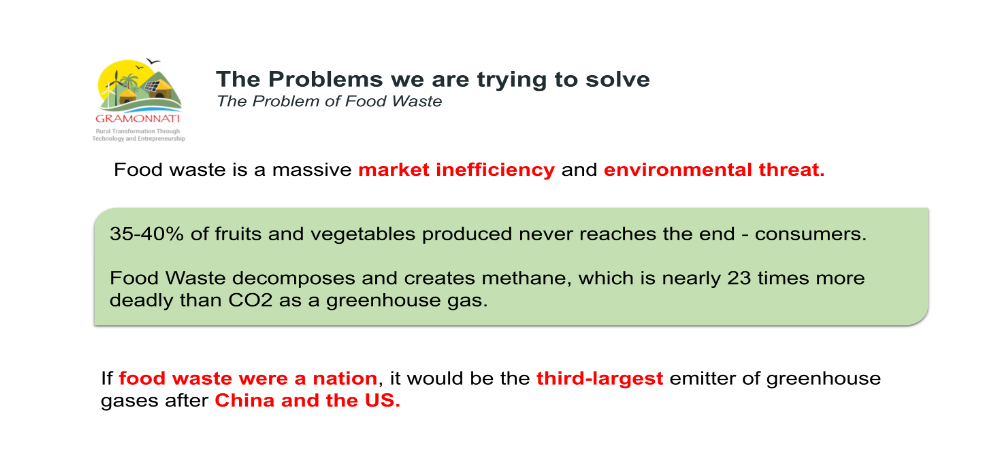
Vermicomposting Leafy Waste:
- Collection: Gather leafy waste such as fallen leaves, grass clippings, and plant trimmings.
- Shredding: Shred or chop the leafy waste into smaller pieces to expedite decomposition.
- Bedding: Create a separate bedding layer in the vermicomposting bin using the shredded leafy waste. Maintain a damp but not saturated state.
- Add Worms: Introduce composting worms into the leafy waste bedding.
- Add Leafy Waste: Place the shredded leafy waste into the vermicomposting bin, burying it within the bedding.
- Moisture and Aeration: Ensure proper moisture levels by periodically spraying water if the bedding feels dry. Regularly turn the bedding to promote aeration and prevent compaction.
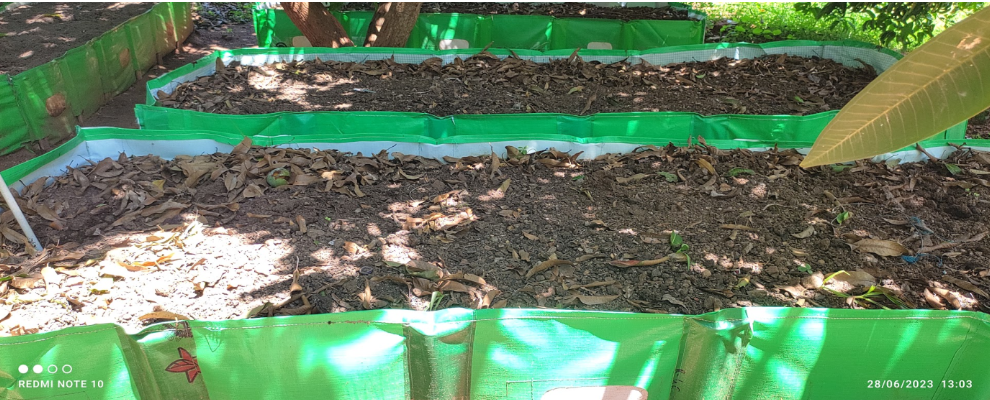
Timelines of Making Vermicompost
Initial Decomposition: This phase typically lasts 2-4 weeks. Organic waste materials start breaking down, and worms begin consuming the waste.
Active Composting: This phase takes around 4-8 weeks, during which decomposition accelerates as worms actively feed on the waste. The materials transform into nutrient-rich vermicast.
Maturation: This phase requires an additional 2-4 weeks or longer. It allows the vermicast to fully mature into nutrient-rich vermicompost, ensuring complete decomposition and stabilization of any remaining organic matter.
Composition and Nutritive Value of Good Quality Vermicompost
Vermicompost, the nutrient-rich organic fertilizer produced through the process of vermicomposting, offers numerous benefits for soil health and plant growth. The composition of vermicompost varies depending on the types of waste materials used in its preparation. Understanding the nutrient content and nutritive value of vermicompost is crucial for optimising its application in agriculture. Let’s explore the typical composition and nutritive value of good quality vermicompost.
Good Quality Vermicompost
The composition of vermicompost is influenced by the organic waste materials that serve as the feedstock for the worms. While the exact nutrient content may vary, the following are some common nutrient ranges found in vermicompost-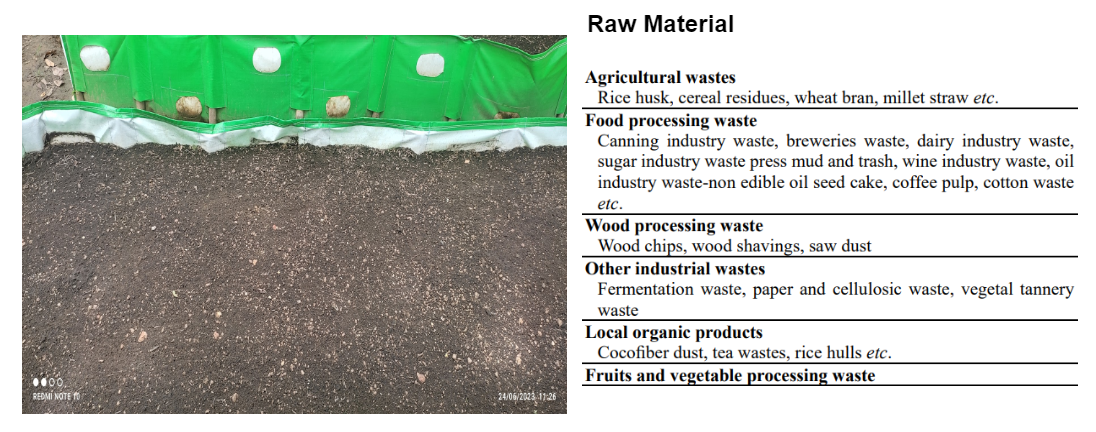
Nutritive Value of Vermicompost
Vermicompost’s nutritive value lies in its balanced composition of essential nutrients. Organic carbon contributes to soil fertility, water retention, and microbial activity. Nitrogen is a vital nutrient for plant growth and development. Phosphorus supports root development, flowering, and fruiting, while potassium enhances disease resistance and overall plant vigour. Calcium and magnesium aid in nutrient uptake and improve soil structure. 
Studies reported that vermicompost application suppressed 20%–40% infection of insect pests i.e. aphids (Myzus persicae), mearly bugs (Pseudococcus spp.) and cabbage white caterpillars (Peiris brassicae) on pepper (Capsicums annuum), cabbage (Brassica oleracea) and tomato (Lycopersicum esculentum).
Gramonnati Trust prioritizes the quality of vermicompost by ensuring proper raw material selection. The application of vermicompost in Gramonnati farms has resulted in notable improvements in carbon levels, organic material, and more. Trace elements like copper, iron, zinc, and sulphur play vital roles in plant metabolism and enzyme activity. These micronutrients are essential for various physiological processes in plants, even in small quantities. By incorporating vermicompost into agricultural practices, we can embrace sustainable and eco-friendly approaches to soil management and nutrient cycling.
Application of Vermicompost for Urban/Rooftop Gardening
Vermicompost, derived from vermicomposting, has versatile applications in agriculture, urban gardening, and soil restoration. It enriches soil health, promotes plant growth, and fosters sustainable ecosystems, making it invaluable for urban environments. Vermicompost plays a pivotal role in building a greener and healthier world. Gramonnati Trust harnesses these resources to cultivate urban gardens, fostering natural ecosystems and maximising community engagement with nature.
Landscaping and Lawns: In urban gardening, vermicompost benefits landscaping and lawns by enhancing soil quality, water retention, and promoting healthy turf. When used as a top dressing or incorporated into the soil before planting trees, shrubs, or ornamental plants, it supports growth and vitality. Vermicompost is valuable for revitalizing damaged or depleted soils, making it an essential tool for restoring urban landscapes and rejuvenating lawns.
Container Gardening and Potting Mixes:
Vermicompost is highly beneficial for container gardening and the creation of potting mixes. When blended with other components, it enhances the soil structure, moisture retention, and nutrient availability within the limited space of containers. This ensures optimal growing conditions for potted plants, including houseplants, herbs, and ornamentals.
Urban Agriculture and Community Gardens:
In urban environments where access to fertile soil may be limited, vermicompost provides an excellent solution for urban agriculture and community gardens. It enables individuals and communities to grow their own food in raised beds, rooftop gardens, or small-scale farming projects. Vermicompost enriches urban soils, helping to overcome nutrient deficiencies and create thriving growing spaces.
Enhancing Urban Gardening with Vermiwash: Boosting Soil Health and Nutrient Retention
Vermiwash is a game-changer in urban gardening, offering a powerful growing medium that improves soil health while minimizing nutrient loss. By diluting vermiwash with water (1:5 to 1:10 ratio) and applying it through foliar spray or soil drench methods, plants receive essential nutrients for robust growth. Applying vermiwash every 10-15 days during the growing season, combined with organic practices like composting and mulching, leads to optimal results. By embracing vermiwash in urban gardening, we can nurture soil fertility, support healthy plant development, and actively contribute to sustainable gardening practices. Experience the benefits of vermiwash and transform your urban garden into a flourishing green oasis.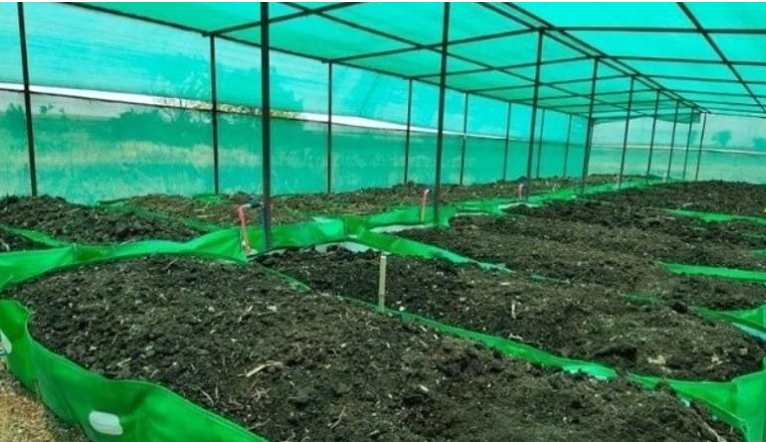
Applications of Vermicompost in Farming: Harnessing the Power of Nutrient-Rich Organic Fertilizer
Let us explore the various applications of vermicompost and how to utilize it effectively in farming.
Seed Sowing and Transplanting:
Vermicompost can be used during seed sowing and transplanting. A sprinkling of vermicompost into seed rows or adding 1-2 handfuls into the planting holes of transplanted vegetables provides a nutrient boost for young plants. As the plants grow, another handful of vermicompost can be spread around the base to support ongoing growth and development.
Top Dressing:
As plants continue to grow, a top dressing of vermicompost can be applied. Spread a handful of vermicompost around the plants, ensuring it doesn’t come into direct contact with the stems. This application provides a slow-release source of nutrients, supports soil health, and enhances overall plant vigour.
Irrigation Water:
Vermicompost can be mixed with water to create vermicompost tea, which can be used for irrigation purposes. Simply add a quantity of vermicompost to water and allow it to sleep for a few hours or overnight. Then, use this nutrient-rich water to irrigate plants, delivering a boost of beneficial microorganisms and plant- available nutrients directly to the root zone.
Potting Mix Amendment:
In nurseries or container gardening, vermicompost can be incorporated into potting mixes. Replace up to 1/3 of the potting soil with vermicompost to enhance nutrient availability, improve soil structure, and promote healthy root development. However, ensure that the vermicompost is used sparingly, as its high nutrient content may inhibit plant growth if applied excessively.
Vermicompost is a valuable resource for sustainable farming practices, providing essential nutrients and promoting soil health. Its applications are diverse, ranging from seed sowing and transplanting to top dressing and as an amendment in potting mixes. By utilizing vermicompost in these ways, farmers can enhance nutrient availability, improve soil structure, and foster healthy plant growth. Embrace the power of vermicompost as a natural, nutrient-rich fertilizer, and witness the positive impact it has on your crops, gardens, and the overall sustainability of agricultural practices.
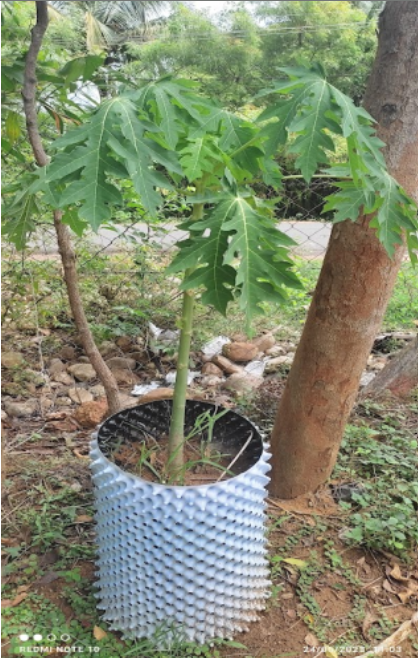
Gratitude Farm-
Gratitude Farms is dedicated to the Gratitude Vermicompost Project, which focuses on vermicomposting as a sustainable waste management and organic fertiliser production method. The project has set up 24 vermicompost production units, comprising specialised bags, under a tree shed. However, like any new endeavour, it faced several challenges during its initial stages. Fortunately, with valuable insights and suggestions provided by the local community and experts, these challenges were successfully overcome. One of the key factors in the project’s success was the implementation of effective methods to accelerate the decomposition process and enhance vermicomposting efficiency. Various raw materials, directly sourced from the field, were utilized in the vermicompost production. These materials included leaves, rice straw, banana waste, and other organic matter. By utilizing locally available resources, the project not only reduced waste but also optimized the nutrient content of the vermicompost. The success of the Gratitude Vermicompost Project can be attributed to the collective efforts of all the stakeholders involved. The dedication and hard work of the project team, local community members, and experts led to positive outcomes. Through their collaboration, approximately 1.1 tonnes of high-quality vermicompost was produced, providing a valuable resource for organic farming and soil enrichment. The project’s achievements serve as a testament to the effectiveness of vermicomposting as a sustainable waste management solution. By converting organic waste into nutrient-rich compost, the project has not only reduced the environmental impact but also promoted the use of organic fertilizers. The utilization of locally available raw materials further reinforces the project’s commitment to sustainability and resource efficiency. Looking ahead, the Gratitude Vermicompost Project is poised to achieve even more significant harvests in the future. The lessons learned and experiences gained during the initial stages will serve as a foundation for future improvements and expansion. With the continued support and engagement of the community and experts, the project has the potential to make a substantial impact on waste management, soil health, and sustainable agriculture in the region.
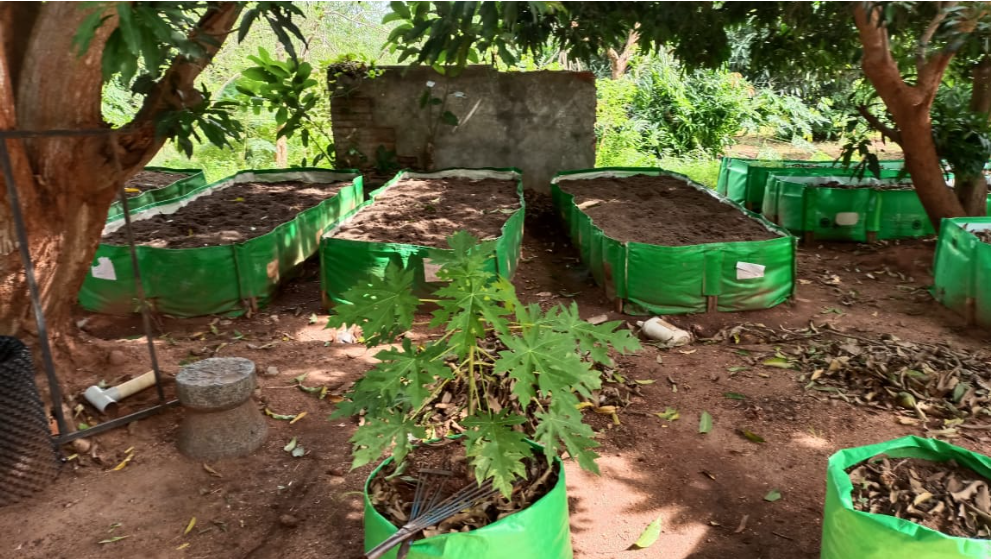
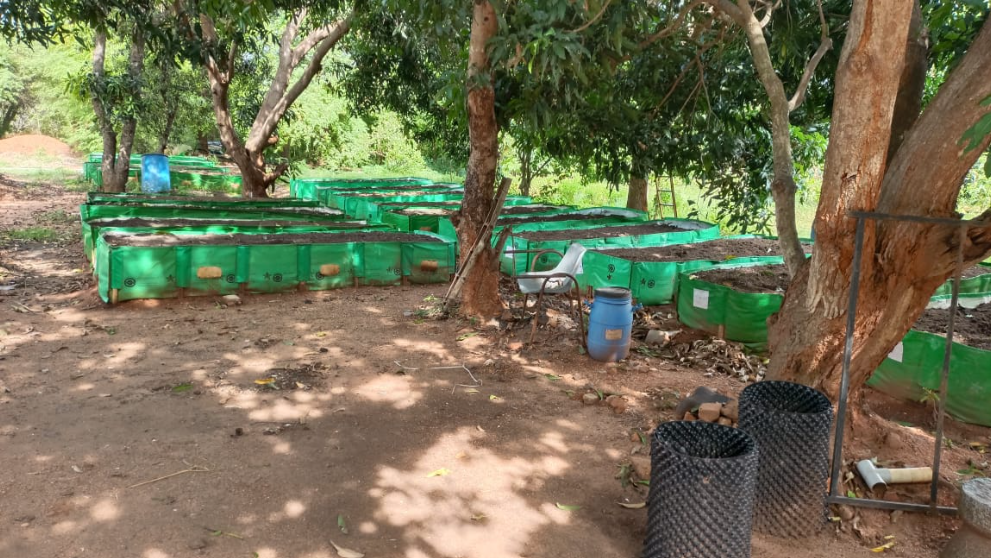
Madras Regimental Centre (MRC) Coonoor –
Gramonnati Trust, a non-profit organisation dedicated to promoting sustainable agricultural practices, has embarked on a vermicompost project at MRC Coonoor. The primary objective of this initiative is to convert waste into high-yield vermicompost while providing dignified livelihood opportunities to ex-servicemen through comprehensive training programs. The project commenced on April 5, 2023, with the installation of 30 specialised vermi-bags. These bags are designed to maximise vermicompost production and have the capacity to yield an impressive 800 kg of premium vermicompost within a span of 90 days. Each vermi-bag is expected to complete four cycles of production throughout the year, resulting in a total output of 3,200 kg of nutrient-rich vermicompost. The anticipated production capacity of this unit comprising 30 vermi-bags is remarkable. At the conclusion of one year, an estimated 96 tons of enriched vermicompost can be generated. This emphasises the potential of the project to contribute significantly to sustainable agricultural practices and the use of chemical-free, organic fertilisers. Gramonnati Trust’s vermicompost project showcases their commitment to addressing environmental concerns and promoting the adoption of organic waste management techniques.
An integral aspect of this initiative is providing training and livelihood opportunities to ex-servicemen. Through comprehensive training programs, Gramonnati Trust equips these individuals with the necessary skills to lead dignified livelihoods in the field of vermicompost production. By empowering ex-servicemen to actively participate in the project, Gramonnati Trust aims to create a positive impact on their lives while also fostering sustainable agricultural practices. The vermicompost project at MRC Coonoor is a remarkable example of the potential of organic waste management and sustainable agricultural practices. It highlights the ability to convert waste into a valuable resource while simultaneously nurturing soil health and promoting environmentally friendly solutions. Gramonnati Trust’s commitment to providing training and livelihood opportunities to ex-servicemen further reinforces the social and economic benefits associated with such initiatives.
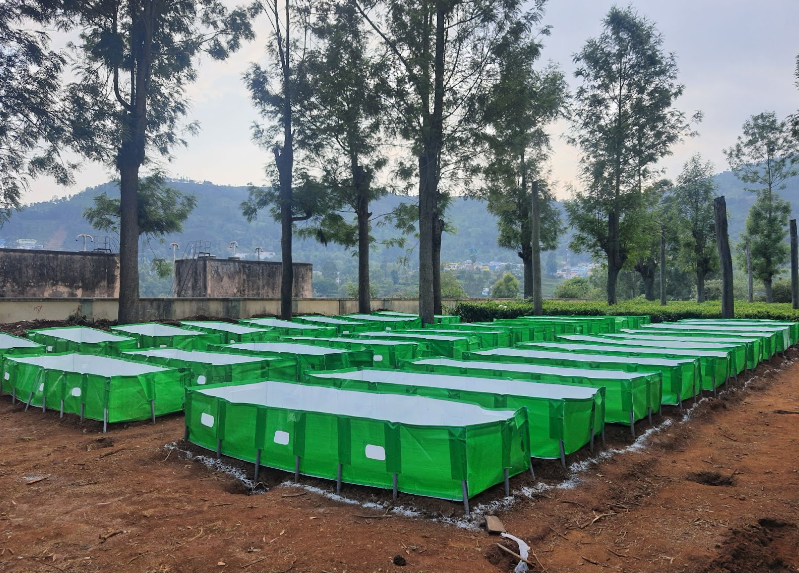
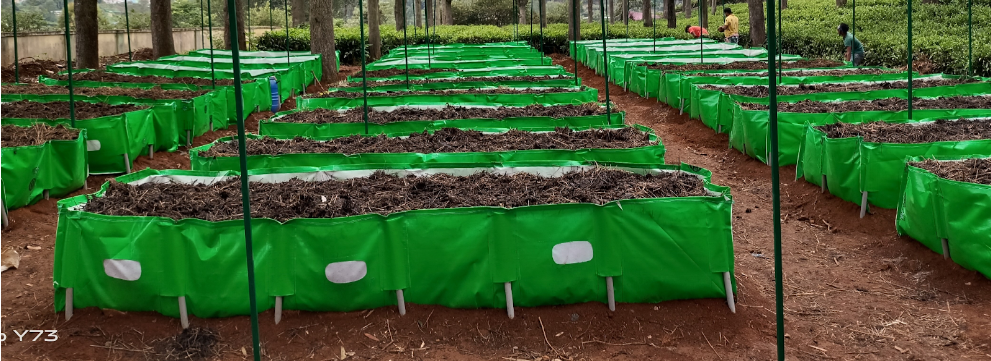
AVA Farms –
AVA Farms, operated by the Gramonnati Trust, is a leading example of sustainable agriculture. Spanning 38.99 acres, the farm incorporates various facilities such as poly houses, greenhouses, open farms, vermicompost units, and grow bag plantations. It has revolutionised sustainable farming through its focus on soil health, innovative practices, and waste reduction initiatives. During the implementation of the vermicompost project, AVA Farms faced challenges related to farmyard manure (FYM) quality, transportation, and collection. However, through strict quality control measures and collaborations with trusted suppliers, they ensured a consistent supply of high-quality FYM for compost production. Partnerships with local transport providers and optimised route planning addressed logistical difficulties and reduced costs in transportation. Standardised collection processes streamlined the integration of FYM into the vermicomposting system.
To address nutrient leaching caused by rainfall, AVA Farms developed drainage systems, minimise nutrient loss. They also encountered weed growth issues due to external sources of FYM. However, the application of vermicompost helped reduce weed growth, highlighting its effectiveness as a weed control measure. AVA Farms’ vermicomposting operations yielded significant outcomes. With an installed capacity of 32 bags, the capital expenditure cost amounted to 2.5 lakh rupees. Each harvest produced approximately 25.6 tonnes of vermicompost. This not only improved soil health but also served as a valuable by-product. Vermi wash, a by-product of the vermicomposting process, acted as a growth promoter and pest controller, enhancing the overall productivity and health of the farm.
The successful implementation of sustainable practices at AVA Farms led to improved soil health, increased crop yields, waste reduction, and market growth. These positive outcomes validate the importance of sustainable agriculture in achieving environmental and economic sustainability. AVA Farms’ journey also yielded valuable lessons, including the significance of strict quality control, efficient transportation and collection, and effective management of nutrient leaching.
In the future, AVA Farms plans to expand its operations and enhance sustainability initiatives further. This includes increasing the adoption of solar energy for dehydration and exploring innovative technologies for waste management and resource utilisation. AVA Farms serves as an inspiration for other farms and organisations seeking to adopt sustainable agriculture practices.
